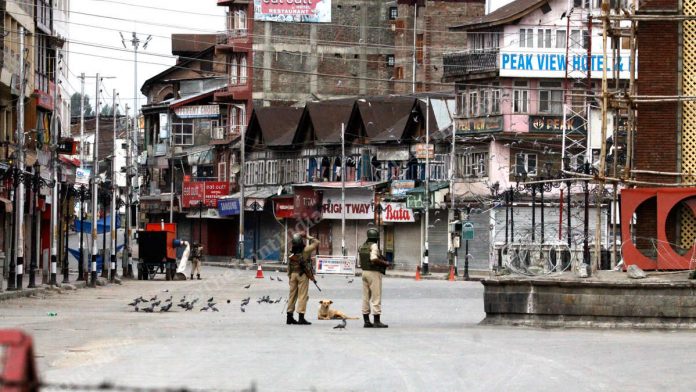Whatever we may think of the merits, the method and the timing of the Narendra Modi government’s move to scrap Article 370, the fact is that the deed has been done. While the constitutionality of the government’s actions has been challenged in the Supreme Court, we should not expect the judiciary to overrule the decision entirely. What ought to be of utmost concern now is: Where do we go from here? How do we try to make India — including Jammu and Kashmir, and Ladakh — a better place than it was before 5 August 2019? If the moment presents us with an opportunity to bring to an end a decades-old conflict that has brutalised Indian society, what should India do to avail it?
I will address these questions in this space over the next few weeks. The Modi government’s action will have broader consequences in the domain of international relations, constitutional rule, and our national self-image. Today, I want to focus on the most important stakeholders in the whole affair: the Kashmiri people. What are the necessary policies that the Modi government must adopt to prevent the situation from deteriorating further?
Contain violence
The immediate priority, of course, is to ensure that violence — both by the protesters and by the security forces — is contained and limited. It is naive to expect that a move as politically salient as the undoing of Article 370 and the demotion of the state into two Union Territories will not attract violent political protests. When the media blackout is lifted, we are bound to see more public agitation: from street protests to stone-pelting to worse. With no political leadership in Kashmir willing to side with New Delhi at this point in time, the risk of violence in the immediate term is severe, and will erupt periodically over the next few years.
What should be the security response? We should seek to stabilise the political situation in the Valley in the short term, which means that the immediate security response must be marginal, not maximal. This means New Delhi must lift the communications blockade soon, and allow public protests and demonstrations to resume. The security response must be calibrated to ensure that protesters do not escalate violence, and that the protests do not spread. The Jammu and Kashmir police force must quickly resume being the security bulwark that it has long been. The damage done to the police force’s morale and its public standing must be reversed.
In my view, the underlying political problem with respect to Kashmir is the bitter affective divide between the Kashmiris and the rest of India. Realist statesmanship — which even Kautilya would recommend — indicates that bridging this affective divide ought to be the Modi government’s fundamental political goal. You can’t apply psychological salve to a population if people only see armed security personnel around them.
Five steps, at the earliest
So, first and foremost, New Delhi must embrace a new thinking, which increases security but reduces the visibility of security personnel. This must be done as early as possible — the longer you wait, the longer you will have to wait. It involves taking a certain amount of risk, but it is necessary if New Delhi’s promises of a better future for the Kashmiri people are to become credible in their eyes.
Second, the Armed Forces Special Powers Act (AFSPA) is another issue where there is an opportunity to make an immediate impact on the Kashmiri mind. So far, the debate has been a binary – between the Kashmiri people who want it to be lifted and the army that correctly argues it cannot operate without the statute. It is opportune to now adopt a surgical and “smart” AFSPA, wherein its provisions can be limited in time and space. New Delhi has fine political minds that can accommodate both Kashmiri demands and the Army’s necessities. There would be nothing like a change in the AFSPA to signal New Delhi’s bona fides, and invite Kashmiri political leaders to reciprocate.
Third, New Delhi should send a large number of administrators to both the new Union Territories. A few hundred civil servants, especially at middle levels, should be assigned to the two UTs on a special three-year deputation. The importance of improving basic governance — education, health, agriculture, trade and industry — often gets lost in the passionate political discourse on counter-insurgency. The erstwhile Jammu and Kashmir administration suffered from an acute capacity deficit arising from the conflict of decades. New Delhi announced development plans worth thousands of crores over the years, but there are not enough capable officials who can even disburse funds properly. As Union Territories, both Jammu & Kashmir and Ladakh will have access to a wider pool of administrators.
Fourth, the youth in Kashmir and Jammu must be offered the right kind of opportunities of employment, growth and social status. Instead of another big, top-down sarkari plan — which have delivered middling results — the successful bottom-up plans to impart skills, improve employability, and boost entrepreneurship launched during Syed Ata Hasnain’s tenure at the Chinar Corps must be revived and scaled up. Plans for economic development are less about funds and more about building individual responsibility, showcasing role models and diminishing mistrust.
Finally, while panchayati and municipal governments are an important element of rebuilding Kashmiri politics, it is critical that the restrictions on legitimate political parties be lifted immediately. Whether you like them or not, they are part of the solution. In the coming months, they will take strident positions in response to the Modi government’s actions. This is understandable. However, there is no finality in politics. The BJP should realise that politics is in India’s national interest, and the ferment in the immediate term could create greater political space in the years to come.

No comments:
Post a Comment